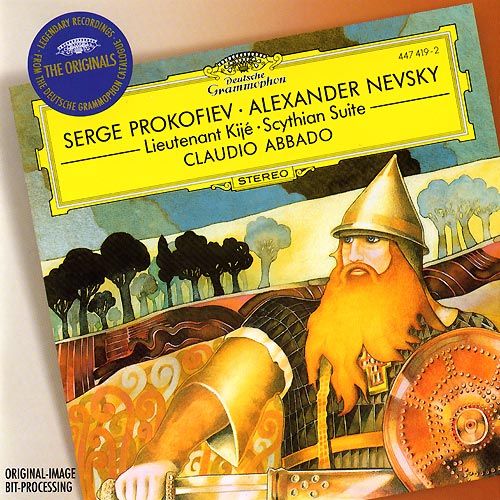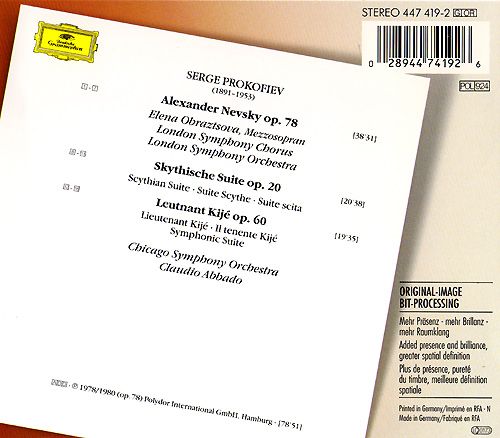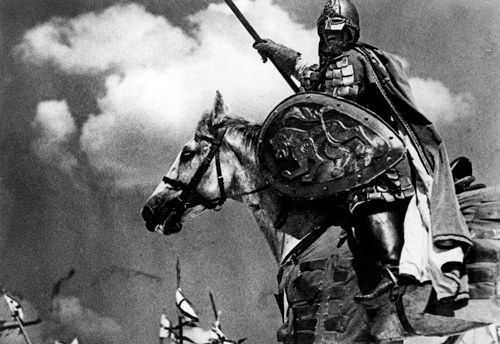wimpel69
11-13-2014, 11:07 AM
EAC-FLAC link below. This is my own rip. Complete artwork,
LOG and CUE files included. Do not share. Buy the original!
Please leave a "Like" or "Thank you" if you enjoyed this!
Sergei Prokofiev and the celebrated film director, Sergei Eisenstein (1898-1948), managed to survive
the purges that decimated Russian intellectual life under Stalin. Together, they made two historically significant
films: Alexander Nevsky in 1938, and Ivan the Terrible, Parts 1 and 2 (No.3 never got beyond
preproduction). Worsening relations between Nazi Germany and the U.S.S.R. decided Stalin to sponsor a film
about Alexander Nevsky, a thirteenth century prince of Novgorod, who routed Swedish invaders in 1240 at the
river Neva (hence his name) and two years later defeated a horde of Teutonic Knights at Lake Chud (aka Peipus),
on what is today the Estonian border. Eisenstein offered to direct and persuaded Prokofiev to score the film.
Ironically, because Stalin and Hitler signed a nonaggression treaty before Nevsky was ready for release, it
was deep-sixed in the Soviet Union, although not elsewhere. Only after Hitler attacked the U.S.S.R. was
the film repatriated as a propaganda tool, by which time Prokofiev had reworked sections of his soundtrack
score into a "dramatic cantata" with texts by himself and V. Lugovskoy. Prokofiev conducted the Moscow
premiere on May 17, 1939.
In "Russia under the Mongolian yoke," high and low registers of the orchestra accompanied Eisenstein's
stark panoramas of bones, skulls, discarded weapons, wasted fields, and sacked villages in the wake of
marauding tartars; music at once eerie, archaic and despairing. The "Song about Alexander Nevsky" is
an uncomplicated telling of Prince Alexander's defeat of invading Swedes "on the wide waters of the
River Neva" in 1240, abetted by local peasants armed with axes and improvised weapons. A quicker
middle section (Pi� mosso) effectively recreates the sounds of battle. In "The Crusaders in Psko"
swaggering, scornful Teuton invaders sing Latin words not easy to translate, perhaps because
Prokofiev intended them to be onomatopoeic rather than narrative. An A minor middle section for
legato strings, which are asked to play "expressively and sadly," hardens before the Crusaders
quell a spirit of insurrection. "Arise, Russian people" exhorts them to defend, in the populist style
mastered by Prokofiev, plainly tuneful but nonetheless perfervid, with a new melody in the middle
section that returns triumphantly in the fifth and seventh movements. "The battle on the ice" is
the longest of the movements and stunningly graphic without needing film to be effective.
The Crusaders, shouting their Latin battle cry, ride wildly against Nevsky's force, who sing "In
our great native Russia no foe shall live...." The breakup of the ice is a terrifying sound, far
surpassing a small studio orchestra and constricted mono sound on the original soundtrack.
In "The field of the dead" the mezzo-soprano soloist becomes a Russian girl, looking for the body
of her lover slain in battle. She vows to kiss the eyelids of all who died, and to wed a "brave"
survivor rather than a "handsome man." A recapitulation of Russian themes celebrates
"Alexander's entry into Pskov" and rejoices in Nevsky's victory, as appropriate in World War II
and after as Stalin meant the film to be in 1937.
In the summer of 1914, Prokofiev, the then-emerging enfant terrible of Russian music, traveled
to London to meet with the ballet impresario Sergei Diaghilev. Diaghilev commissioned the young
composer to write a ballet with a prehistoric or fairy-tale scenario -- hoping, perhaps, for the
same kind of success he had recently enjoyed with the like-themed ballets of Stravinsky. Prokofiev
returned to St. Petersburg and engaged the services of poet Sergei Gorodetzky in developing an
effective story line. The composer settled on a theme centered on a prehistoric tribe of barbarians,
the Scythians, known to drink blood and engage in other similarly gruesome practices. The immediate
musical result was Ala and Lolli (1914-1915), which Prokofiev first presented to Diaghilev in
the form of a nearly complete piano score. Diaghilev, however, rejected the work as too close in spirit
to Stravinsky's Rite of Spring, fearing comparisons to the still-new succ�s du scandale. To
placate Prokofiev, Diaghilev commissioned from the dejected composer a new ballet, Chout (1915).
Before fulfulling that commission, though, Prokofiev turned his attention back to his orphaned ballet,
distilling its most effective numbers into the Scythian Suite.
The suite is cast in four movements whose titles readily evoke the ballet's prehistoric themes:
"The Adoration of Veles and Ala," "The Evil God and Dance of the Pagan Monster," "Night," and
"The Glorious Departure of Lolli and the Sun's Procession." What is most immediately striking
about the score is Prokofiev's brilliant orchestration. The music is the product of a 23 year old,
yet it clearly demonstrates the unmistakable confidence, control, and imagination of a seasoned
master. The vivid colors and instrumental effects are such that the work, despite its relative
unfamiliarity, survives as one of the most brilliant orchestral essays of its era.
Beginning in the 1930s, Prokofiev became one of the first composers of international repute
to write music for films. His silver screen career began with the score to Alexander Feinzimmer's
Lieutenant Kij� (1933), released in America under the title The Czar Wants to Sleep. Thoug
h the film is infrequently encountered today, Prokofiev's music has enjoyed tremendous popularity
in its incarnation as a five-movement concert suite. The music of Lieutenant Kij� is refreshingly
satirical, a perfect counterpart to a story about a nonexistent soldier -- "born" of a copyist's error -
- who is provided an identity, a heroic military background, and even a wife. Because the Czar
himself is led to believe in Kij�'s existence, his courtiers are afraid to tell him the truth. When the
Czar desires to meet this great hero, it becomes clear that Kij� must be killed off. The Czar
attends Kij�'s funeral and, over an empty coffin, laments the loss of such a hero.

Music Composed by
Sergei Prokofiev
Played by the
London Symphony Orchestra
Chicago Symphony Orchestra
With the
London Symphony Chorus
And
Elena Obraztsova (mezzo-soprano)
Conducted by
Claudio Abbado

"Forget the movie, Abbado�s Alexander Nevsky is more vivid than anything you�ll see on the screen.
With gutsy singing from the London Symphony Chorus, a fine alto solo from Obratsova in �The Field
of the Dead,� and terrifying sonorities in The Crusaders in Pskov, this really is the best version available.
Abbado pulls out all the stops for the thrilling Battle on the Ice�in the movie the music for this sequence
isn�t continuous, and in Temirkanov�s version of the complete file score they resort to battle noises to
fill in the gaps just when the action reaches a peak of frenzy. Prokofiev stitches the various bits together
brilliantly in the cantata, and the moment where the two sides collide finds Abbado, for once, going
complete crazy and letting all hell break loose from the assembled forces. It�s pulverizing.
The couplings are equally enjoyable. Lieutenant Kij� is colorful and just about perfectly played. No one
invests the music with as much character as Ormandy on Sony, but there�s nothing to complain about
here. The Scythian Suite is, hands down, the finest version available�those Chicago brass in The Enemy
God (second movement) have to be heard to be believed (sound clip). The third movement (Night) has a
wonderful, velvety atmosphere, while the final crescendo will blow your speakers to bits and scare the
hell out of your neighbors. This is surely one of Abbado�s greatest (and loudest) records."
Classics Today http://i8.photobucket.com/albums/a29/wombat65/p10s10_zps3583ad3e.gif

DOWNLOAD LINK (FLAC) - https://mega.co.nz/#!7MBAHC6D!cAMoydOX1OqtrEAeWJF-LwBBELBD52AH-O5Wu5GrLi4
mp3 - https://mega.co.nz/#!ud4ClRLT!PScDZLfhSlzIDGcYnG-OvKJ3zVKIKUgQzVVlC8AsZA0
Source: Deutsche Grammophon CD, 1995 (my rip!)
Formats: FLAC(RAR), ADD Stereo, Level: -5, mp3/320, CBR)
File Sizes: 409 MB / 234 MB (incl. artwork & booklet)
Enjoy! Don't share! Buy the origina! Please leave a "Like" or "Thank you" if you enjoyed this! :)
LOG and CUE files included. Do not share. Buy the original!
Please leave a "Like" or "Thank you" if you enjoyed this!
Sergei Prokofiev and the celebrated film director, Sergei Eisenstein (1898-1948), managed to survive
the purges that decimated Russian intellectual life under Stalin. Together, they made two historically significant
films: Alexander Nevsky in 1938, and Ivan the Terrible, Parts 1 and 2 (No.3 never got beyond
preproduction). Worsening relations between Nazi Germany and the U.S.S.R. decided Stalin to sponsor a film
about Alexander Nevsky, a thirteenth century prince of Novgorod, who routed Swedish invaders in 1240 at the
river Neva (hence his name) and two years later defeated a horde of Teutonic Knights at Lake Chud (aka Peipus),
on what is today the Estonian border. Eisenstein offered to direct and persuaded Prokofiev to score the film.
Ironically, because Stalin and Hitler signed a nonaggression treaty before Nevsky was ready for release, it
was deep-sixed in the Soviet Union, although not elsewhere. Only after Hitler attacked the U.S.S.R. was
the film repatriated as a propaganda tool, by which time Prokofiev had reworked sections of his soundtrack
score into a "dramatic cantata" with texts by himself and V. Lugovskoy. Prokofiev conducted the Moscow
premiere on May 17, 1939.
In "Russia under the Mongolian yoke," high and low registers of the orchestra accompanied Eisenstein's
stark panoramas of bones, skulls, discarded weapons, wasted fields, and sacked villages in the wake of
marauding tartars; music at once eerie, archaic and despairing. The "Song about Alexander Nevsky" is
an uncomplicated telling of Prince Alexander's defeat of invading Swedes "on the wide waters of the
River Neva" in 1240, abetted by local peasants armed with axes and improvised weapons. A quicker
middle section (Pi� mosso) effectively recreates the sounds of battle. In "The Crusaders in Psko"
swaggering, scornful Teuton invaders sing Latin words not easy to translate, perhaps because
Prokofiev intended them to be onomatopoeic rather than narrative. An A minor middle section for
legato strings, which are asked to play "expressively and sadly," hardens before the Crusaders
quell a spirit of insurrection. "Arise, Russian people" exhorts them to defend, in the populist style
mastered by Prokofiev, plainly tuneful but nonetheless perfervid, with a new melody in the middle
section that returns triumphantly in the fifth and seventh movements. "The battle on the ice" is
the longest of the movements and stunningly graphic without needing film to be effective.
The Crusaders, shouting their Latin battle cry, ride wildly against Nevsky's force, who sing "In
our great native Russia no foe shall live...." The breakup of the ice is a terrifying sound, far
surpassing a small studio orchestra and constricted mono sound on the original soundtrack.
In "The field of the dead" the mezzo-soprano soloist becomes a Russian girl, looking for the body
of her lover slain in battle. She vows to kiss the eyelids of all who died, and to wed a "brave"
survivor rather than a "handsome man." A recapitulation of Russian themes celebrates
"Alexander's entry into Pskov" and rejoices in Nevsky's victory, as appropriate in World War II
and after as Stalin meant the film to be in 1937.
In the summer of 1914, Prokofiev, the then-emerging enfant terrible of Russian music, traveled
to London to meet with the ballet impresario Sergei Diaghilev. Diaghilev commissioned the young
composer to write a ballet with a prehistoric or fairy-tale scenario -- hoping, perhaps, for the
same kind of success he had recently enjoyed with the like-themed ballets of Stravinsky. Prokofiev
returned to St. Petersburg and engaged the services of poet Sergei Gorodetzky in developing an
effective story line. The composer settled on a theme centered on a prehistoric tribe of barbarians,
the Scythians, known to drink blood and engage in other similarly gruesome practices. The immediate
musical result was Ala and Lolli (1914-1915), which Prokofiev first presented to Diaghilev in
the form of a nearly complete piano score. Diaghilev, however, rejected the work as too close in spirit
to Stravinsky's Rite of Spring, fearing comparisons to the still-new succ�s du scandale. To
placate Prokofiev, Diaghilev commissioned from the dejected composer a new ballet, Chout (1915).
Before fulfulling that commission, though, Prokofiev turned his attention back to his orphaned ballet,
distilling its most effective numbers into the Scythian Suite.
The suite is cast in four movements whose titles readily evoke the ballet's prehistoric themes:
"The Adoration of Veles and Ala," "The Evil God and Dance of the Pagan Monster," "Night," and
"The Glorious Departure of Lolli and the Sun's Procession." What is most immediately striking
about the score is Prokofiev's brilliant orchestration. The music is the product of a 23 year old,
yet it clearly demonstrates the unmistakable confidence, control, and imagination of a seasoned
master. The vivid colors and instrumental effects are such that the work, despite its relative
unfamiliarity, survives as one of the most brilliant orchestral essays of its era.
Beginning in the 1930s, Prokofiev became one of the first composers of international repute
to write music for films. His silver screen career began with the score to Alexander Feinzimmer's
Lieutenant Kij� (1933), released in America under the title The Czar Wants to Sleep. Thoug
h the film is infrequently encountered today, Prokofiev's music has enjoyed tremendous popularity
in its incarnation as a five-movement concert suite. The music of Lieutenant Kij� is refreshingly
satirical, a perfect counterpart to a story about a nonexistent soldier -- "born" of a copyist's error -
- who is provided an identity, a heroic military background, and even a wife. Because the Czar
himself is led to believe in Kij�'s existence, his courtiers are afraid to tell him the truth. When the
Czar desires to meet this great hero, it becomes clear that Kij� must be killed off. The Czar
attends Kij�'s funeral and, over an empty coffin, laments the loss of such a hero.

Music Composed by
Sergei Prokofiev
Played by the
London Symphony Orchestra
Chicago Symphony Orchestra
With the
London Symphony Chorus
And
Elena Obraztsova (mezzo-soprano)
Conducted by
Claudio Abbado

"Forget the movie, Abbado�s Alexander Nevsky is more vivid than anything you�ll see on the screen.
With gutsy singing from the London Symphony Chorus, a fine alto solo from Obratsova in �The Field
of the Dead,� and terrifying sonorities in The Crusaders in Pskov, this really is the best version available.
Abbado pulls out all the stops for the thrilling Battle on the Ice�in the movie the music for this sequence
isn�t continuous, and in Temirkanov�s version of the complete file score they resort to battle noises to
fill in the gaps just when the action reaches a peak of frenzy. Prokofiev stitches the various bits together
brilliantly in the cantata, and the moment where the two sides collide finds Abbado, for once, going
complete crazy and letting all hell break loose from the assembled forces. It�s pulverizing.
The couplings are equally enjoyable. Lieutenant Kij� is colorful and just about perfectly played. No one
invests the music with as much character as Ormandy on Sony, but there�s nothing to complain about
here. The Scythian Suite is, hands down, the finest version available�those Chicago brass in The Enemy
God (second movement) have to be heard to be believed (sound clip). The third movement (Night) has a
wonderful, velvety atmosphere, while the final crescendo will blow your speakers to bits and scare the
hell out of your neighbors. This is surely one of Abbado�s greatest (and loudest) records."
Classics Today http://i8.photobucket.com/albums/a29/wombat65/p10s10_zps3583ad3e.gif

DOWNLOAD LINK (FLAC) - https://mega.co.nz/#!7MBAHC6D!cAMoydOX1OqtrEAeWJF-LwBBELBD52AH-O5Wu5GrLi4
mp3 - https://mega.co.nz/#!ud4ClRLT!PScDZLfhSlzIDGcYnG-OvKJ3zVKIKUgQzVVlC8AsZA0
Source: Deutsche Grammophon CD, 1995 (my rip!)
Formats: FLAC(RAR), ADD Stereo, Level: -5, mp3/320, CBR)
File Sizes: 409 MB / 234 MB (incl. artwork & booklet)
Enjoy! Don't share! Buy the origina! Please leave a "Like" or "Thank you" if you enjoyed this! :)